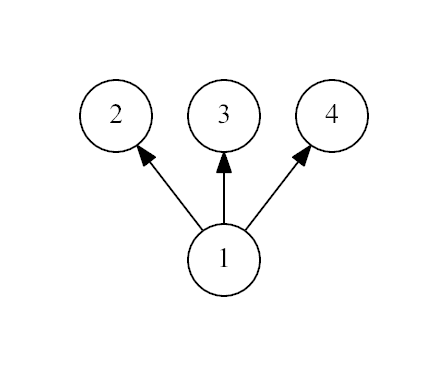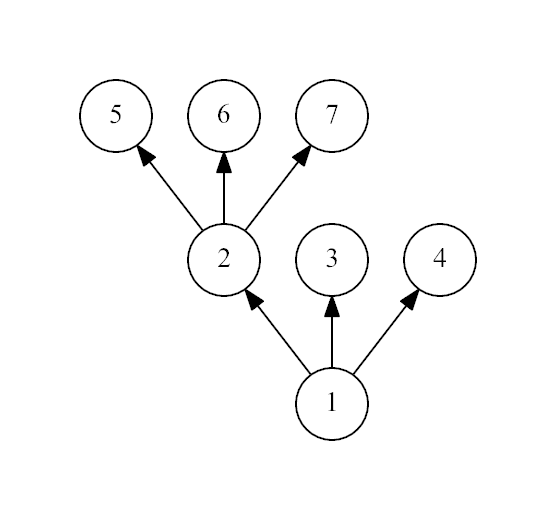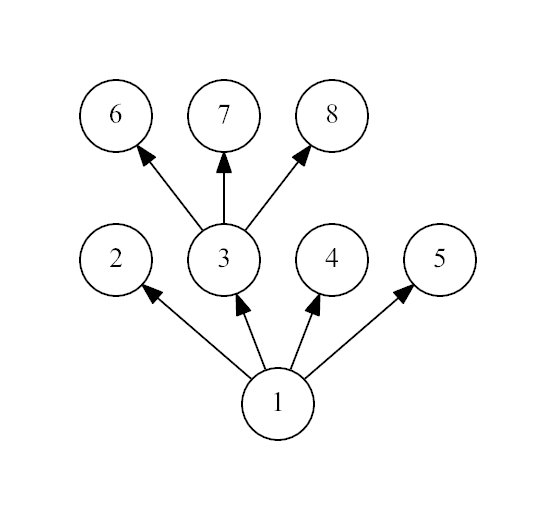The following problem is well-known: given integers n and m, calculate
 ,
,where 2n = 2·2·...·2 (n factors), and  denotes the remainder of division of x by y.
denotes the remainder of division of x by y.
You are asked to solve the "reverse" problem. Given integers n and m, calculate
 .
.The first line contains a single integer n (1 ≤ n ≤ 108).
The second line contains a single integer m (1 ≤ m ≤ 108).
Output a single integer — the value of  .
.
4
42
10
1
58
0
98765432
23456789
23456789
In the first example, the remainder of division of 42 by 24 = 16 is equal to 10.
In the second example, 58 is divisible by 21 = 2 without remainder, and the answer is 0.
1 #include <iostream> 2 #include <stdio.h> 3 #define ll long long 4 using namespace std; 5 const int N = 1e5+10; 6 int n, m; 7 int main() { 8 cin >> n >> m; 9 if(n >= 30) cout << m << endl; 10 else { 11 int ans = 1; 12 for(int i = 1; i <= n; i ++) { 13 ans *= 2; 14 } 15 cout << m % ans << endl; 16 } 17 return 0; 18 }
Consider a rooted tree. A rooted tree has one special vertex called the root. All edges are directed from the root. Vertex u is called a child of vertex v and vertex v is called a parent of vertex u if there exists a directed edge from v to u. A vertex is called a leaf if it doesn‘t have children and has a parent.
Let‘s call a rooted tree a spruce if its every non-leaf vertex has at least 3 leaf children. You are given a rooted tree, check whether it‘s a spruce.
The definition of a rooted tree can be found here.
The first line contains one integer n — the number of vertices in the tree (3 ≤ n ≤ 1 000). Each of the next n - 1 lines contains one integer pi (1 ≤ i ≤ n - 1) — the index of the parent of the i + 1-th vertex (1 ≤ pi ≤ i).
Vertex 1 is the root. It‘s guaranteed that the root has at least 2 children.
Print "Yes" if the tree is a spruce and "No" otherwise.
4
1
1
1
Yes
7
1
1
1
2
2
2
No
8
1
1
1
1
3
3
3
Yes
The first example:

The second example:

It is not a spruce, because the non-leaf vertex 1 has only 2 leaf children.
The third example:

1 #include <iostream> 2 #include <vector> 3 #include <stdio.h> 4 #define ll long long 5 using namespace std; 6 const int N = 1e3+10; 7 int n, fa[N]; 8 vector<int> vs[N]; 9 bool ok(int x) { 10 int ans = vs[x].size(); 11 if(ans == 0) return true; 12 ans = 0; 13 for(int i = 0; i < vs[x].size(); i ++) { 14 if(vs[vs[x][i]].size() == 0) ans++; 15 } 16 if(ans >= 3) return true; 17 else return false; 18 } 19 int main() { 20 int x; 21 cin >> n; 22 for(int i = 2; i <= n; i ++) { 23 cin >> x; 24 vs[x].push_back(i); 25 } 26 bool flag = true; 27 for(int i = 1; i <= n; i ++) { 28 if(!ok(i)) { 29 flag = false; 30 break; 31 } 32 } 33 if(flag) printf("Yes\n"); 34 else printf("No\n"); 35 return 0; 36 }
A New Year party is not a New Year party without lemonade! As usual, you are expecting a lot of guests, and buying lemonade has already become a pleasant necessity.
Your favorite store sells lemonade in bottles of n different volumes at different costs. A single bottle of type i has volume 2i - 1 liters and costs ci roubles. The number of bottles of each type in the store can be considered infinite.
You want to buy at least L liters of lemonade. How many roubles do you have to spend?
The first line contains two integers n and L (1 ≤ n ≤ 30; 1 ≤ L ≤ 109) — the number of types of bottles in the store and the required amount of lemonade in liters, respectively.
The second line contains n integers c1, c2, ..., cn (1 ≤ ci ≤ 109) — the costs of bottles of different types.
Output a single integer — the smallest number of roubles you have to pay in order to buy at least L liters of lemonade.
4 12
20 30 70 90
150
4 3
10000 1000 100 10
10
4 3
10 100 1000 10000
30
5 787787787
123456789 234567890 345678901 456789012 987654321
44981600785557577
In the first example you should buy one 8-liter bottle for 90 roubles and two 2-liter bottles for 30 roubles each. In total you‘ll get 12 liters of lemonade for just 150 roubles.
In the second example, even though you need only 3 liters, it‘s cheaper to buy a single 8-liter bottle for 10 roubles.
In the third example it‘s best to buy three 1-liter bottles for 10 roubles each, getting three liters for 30 roubles.
1 #include <iostream> 2 #include <stdio.h> 3 #define ll long long 4 #include <algorithm> 5 using namespace std; 6 const int N = 1e5+10; 7 struct Nod { 8 ll c,l; 9 double a; 10 }nod[33]; 11 ll n, l, cost[33]; 12 bool cmp(Nod a, Nod b) { 13 if(a.a != b.a) return a.a < b.a; 14 else return a.l > b.l; 15 } 16 int main() { 17 cin >> n >> l; 18 for(ll i = 1; i <= n; i ++) { 19 cin >> nod[i].c; 20 nod[i].l = (1<<(i-1)); 21 nod[i].a = 1.0*nod[i].c/nod[i].l; 22 } 23 sort(nod+1,nod+1+n,cmp); 24 ll sum = 0, tmp; 25 for(ll i = 1; i <= n; i ++) { 26 ll tmp = l/nod[i].l; 27 l -= tmp*nod[i].l; 28 sum += tmp*nod[i].c; 29 if(l > 0) { 30 cost[i] = sum + nod[i].c; 31 } else { 32 cost[i] = sum; 33 } 34 } 35 for(int i = 1; i <= n; i ++) { 36 if(sum > cost[i]) { 37 sum = cost[i]; 38 } 39 } 40 cout << sum << endl; 41 return 0; 42 }
